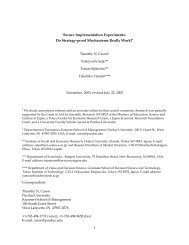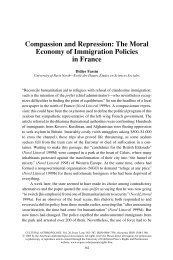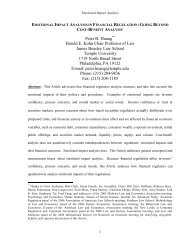Governance, Growth, and Development Decision-making - School of ...
Governance, Growth, and Development Decision-making - School of ...
Governance, Growth, and Development Decision-making - School of ...
You also want an ePaper? Increase the reach of your titles
YUMPU automatically turns print PDFs into web optimized ePapers that Google loves.
2. Causal Relationships<br />
There is a large econometric literature linking institutions to<br />
growth, 2 which I will not deal with in any depth here, except to note<br />
that “institutions” (as well as the related term “governance”) as an<br />
independent variable is <strong>of</strong>ten used inconsistently, referring at different<br />
times to state capacity, rule <strong>of</strong> law, <strong>and</strong> democracy. Each <strong>of</strong> these<br />
three components <strong>of</strong> political development has different effects on<br />
growth.<br />
For example, state capacity would seem to be much more<br />
important than either rule <strong>of</strong> law or democracy, particularly at low<br />
levels <strong>of</strong> per capita GDP (i.e., below $1000). Neither South Korea<br />
during the 1960s or 70s, nor China from the period 1978-present,<br />
had a strong rule <strong>of</strong> law; property rights were partial <strong>and</strong> insecure,<br />
<strong>and</strong> there was a weak legal infrastructure in both countries. They<br />
did, however, possess strong developmental states that maintained<br />
political order <strong>and</strong> pursued pro-developmental rather than predatory<br />
policies. Their growth rates were not worse than territories like<br />
Hong Kong or Singapore that inherited modern rule-<strong>of</strong>-law systems<br />
from the British.<br />
There is a growing literature showing how property rights do not<br />
have to be universal to sustain impressive levels <strong>of</strong> economic growth,<br />
2<br />
For example: Acemoglu, Daron, Robinson, James A. et. al., (2001). “The<br />
Colonial Origins <strong>of</strong> Comparative <strong>Development</strong>: An Empirical Investigation,”<br />
American Economic Review 91(5): 1369–401<br />
—Knack, Steve, <strong>and</strong> Phil Keefer. “Institutions <strong>and</strong> Economic Performance:<br />
Cross-Country Tests Using Alternative Institutional Measures.” Economics<br />
<strong>and</strong> Politics 7 (1995): 207–27<br />
—Rodrik, Dani, Arvind Subramanian, <strong>and</strong> Francesco Trebbi. “Institutions<br />
Rule: The Primacy <strong>of</strong> Institutions over Geography <strong>and</strong> Integration<br />
in Economic <strong>Development</strong>.” Journal <strong>of</strong> Economic <strong>Growth</strong> Vol. 9, No. 2,<br />
June 2004<br />
—Kaufmann, Daniel, <strong>and</strong> Aart Kraay. “<strong>Growth</strong> without <strong>Governance</strong>,” in<br />
Economía, Winter 2002. http://www.worldbank.org/wbi/governance/pubs/<br />
growthgov.html<br />
Francis Fukuyama 27

















